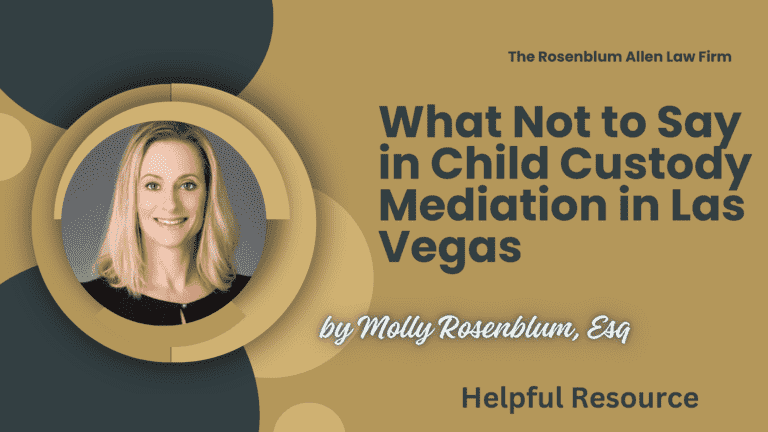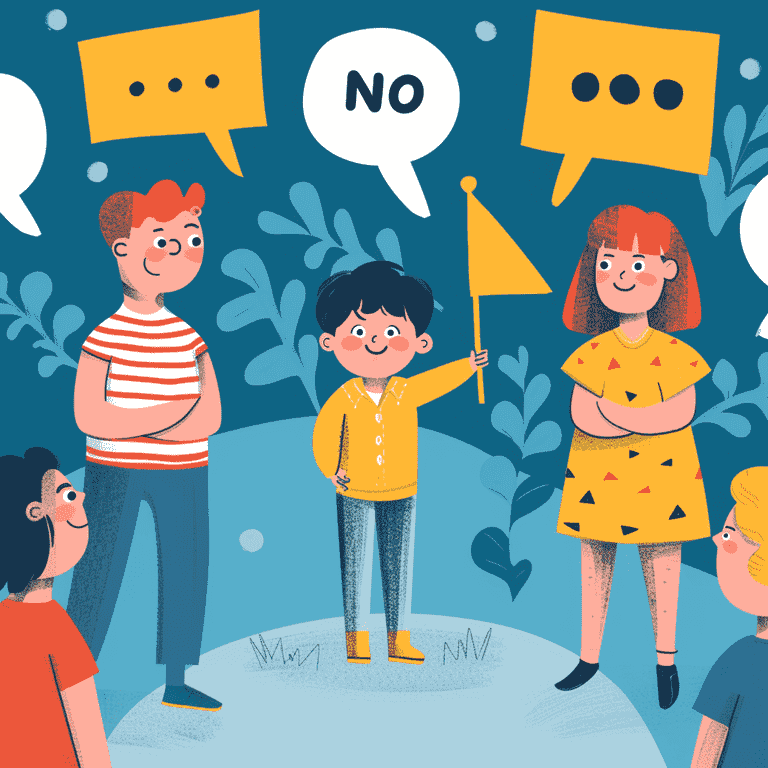Welcome to our guide.
It is for those in the complex world of child custody mediation in Las Vegas.
You understand the nuances of what to say. And, more importantly, what not to say can greatly affect the outcome of your mediation.
This guide aims to give you key insights and strategies. They will help you communicate well during this critical time.
The focus is on the well-being of your children and keeping a constructive dialogue.

 Overview of Child Custody Mediation in Las Vegas
Overview of Child Custody Mediation in Las Vegas
Mediation for child custody in Las Vegas is crucial. Parents work together to create a plan that serves their children’s best interests. In this process, a neutral third party, the mediator, helps in discussions. They also help in resolving conflicts. The goal is to reach an agreeable solution. This solution should be without the need for a court battle.
Importance of Communication During Mediation
Effective communication is the cornerstone of successful mediation. How you express your concerns and desires can greatly impact the mediator’s view. It can also shape the mediation’s direction. It’s not just about what you say but how you say it.
The Reason You Haven’t Hired A Child Custody Attorney Yet
We’re ready to fight for the rights of your family if you hire us. We’re waiting to jump into action on the behalf of your family.
Understanding Mediation in the Context of Las Vegas Family Law
Las Vegas family law sets the legal framework for child custody mediation. Knowing these laws can help you navigate mediation better.
Brief on Las Vegas Family Law and Child Custody
In Las Vegas, child custody laws focus on the child’s best interests. We consider the child’s physical, emotional, and educational needs. We also consider the parent’s ability to meet these needs.
The Role of Mediation in Child Custody Cases
Mediation plays a pivotal role in Las Vegas child custody cases. It provides a less adversarial and more collaborative environment than a courtroom. Here, parents can discuss and agree on the details of their child custody plan. They will be guided by the mediator.

Common Mistakes to Avoid in Child Custody Mediation
Navigating child custody mediation requires a careful approach. Knowing common pitfalls can help you avoid making statements. They could tilt the balance against you.
Emotional Responses and Their Impact
Keep emotions in check: Avoid letting anger or frustration dictate your words.
Focus on constructive dialogue: Prioritize problem-solving over blame.
Focusing on the Negative Aspects of the Other Parent
Avoid saying bad things about the other parent. Mediators dislike this. It can hurt the mediation’s outcome. Remember, the focus is to find the best solution for the child. It’s not for airing personal grievances.

What Not to Say About the Other Parent
It’s vital to discuss the other parent with caution and respect. Keep the child’s best interests at heart.
Criticizing Parenting Skills
Avoiding Personal Attacks
Refrain from making personal attacks or questioning the other parent’s basic competency. Instead, if you have specific concerns, address them constructively.
Focusing on Child’s Best Interest
Always steer the conversation back to what is best for the child. Avoid focusing on what is wrong with the other parent’s approach or personality.
Discussing Past Relationship Issues
Separating Marital Issues from Parenting
Your past marital problems should not influence the child custody discussions. Focus on the present and future parenting, not past relationship issues.
The Relevance of Past Relationship Issues in Custody Cases
Past relationship issues are generally irrelevant in custody mediation. They matter only if they affect parenting or the child’s well-being.

What Not to Say About the Child’s Preferences
When discussing your child’s preferences, you must balance two things: acknowledging their wishes and prioritizing their best interests. Please do not project your desires onto the child or dismiss their perspectives.
Disregarding Child’s Wishes
Understanding the Child’s Perspective
Listen and validate: Acknowledge your child’s feelings and opinions, showing they are heard and valued.
Age-appropriate considerations: Remember that a child’s age and maturity level significantly affect how their preferences are weighed in mediation.
Age and Maturity Considerations
For younger children: Understand that younger children may not fully grasp the situation, and various factors might influence their preferences.
For older children: Older children’s opinions may carry more weight, but ensuring these preferences align with their best interests is still essential.
Imposing Personal Desires on the Child
Balancing Parental Wishes and Child’s Needs
Parental biases: Be mindful of your preferences and avoid projecting them onto your child.
Child’s well-being: Always place the child’s emotional and physical well-being above personal preferences or desires.
Recognizing the Child’s Autonomy
Respecting individuality: Understand that your child is an individual with their own needs and preferences.
Healthy boundaries: Maintain a respectful distance between your emotional needs and your child’s, preserving their autonomy.

Financial Matters and Lifestyle Choices
Discussing money and lifestyle can be a minefield in child custody mediation. Approach these topics carefully and address them in a constructive and respectful manner.
Discussing Financial Disputes
Keeping Financial Issues Separate from Custody
Focus on the child: Keep financial discussions centered on the child’s needs, not personal grievances.
Practical approach: Discuss financial responsibilities in a factual, non-confrontational manner.
Understanding the Role of Child Support
Purpose of child support: Explain that child support is meant to cover the child’s needs and is not a punitive measure against either parent.
Fair assessment: Advocate for a fair evaluation of financial contributions based on each parent’s ability to contribute.
Lifestyle and Personal Habits
Addressing Lifestyle Differences Constructively
Respect differences: Acknowledge that different lifestyles and parenting styles can be valid and beneficial for the child.
Focus on safety and stability: Ensure that discussions about lifestyle choices are centered on the child’s security and emotional stability.
Avoiding Judgmental Comments
Non-critical language: Use neutral language when discussing lifestyle choices, avoiding judgmental or critical tones.
Problem-solving attitude: Approach differences in lifestyle as issues to be solved collaboratively, not as grounds for criticism.

Strategies for Effective Communication
Effective communication is the key to a successful mediation. The child’s best interest involves being heard and understanding the other party.
Staying Focused on the Child’s Well-being
Prioritizing Child’s Needs Over Personal Grievances
Child-centric approach: Keep the conversation focused on the child’s needs, health, and happiness.
Avoiding personal attacks: Steer clear of using the child as a platform for airing personal issues with the other parent.
Constructive Communication Techniques
Active listening: Show that you are listening and considering the other parent’s perspective.
Clear expression: Express your thoughts and concerns clearly and respectfully.
Managing Emotions and Stress
Techniques for Emotional Regulation
Breathing exercises: Use deep breathing to maintain calmness during discussions.
Taking breaks: Don’t hesitate to request a break if emotions run high.
Seeking Support When Needed
Professional guidance: Consider seeking support from a therapist or counselor to manage stress and emotions.
Support network: Lean on friends, family, or support groups for emotional backing and advice

Breaking It All Down for You
We hope this guide has been informative. It has helped prepare you for child custody mediation in Las Vegas.
By being mindful of your communication, you are focusing on your child’s needs.
This helps you take a big step toward a good resolution for your family.
Remember, this process can affect your child’s life. It also affects your relationship with them.
Choose your words wisely. Stay focused on the child’s best interests.
Approach each discussion with empathy and understanding.

Frequently Asked Questions
Can mediation decide child custody in Las Vegas?
Absolutely. Mediation plays a crucial role in determining child custody arrangements in Las Vegas. It’s a collaborative effort where parents work alongside a mediator to reach a resolution that prioritizes the child’s well-being.
How long does child custody mediation typically take in Las Vegas?
The duration of child custody mediation in Las Vegas varies depending on the complexity of the case and the level of cooperation between parents. It can range from a few hours to multiple sessions over several weeks or months.
What happens if we can’t reach a mediation agreement?
If mediation doesn’t result in an agreement, the case may proceed to court. In court, a judge will make the final custody decisions.
Is what’s said in mediation confidential?
Generally, yes. Confidentiality is typically maintained in child custody mediation in Las Vegas, meaning discussions cannot be used in court unless both parties agree otherwise.
Can a child choose which parent to live with in Las Vegas?
While a child’s preference may be considered, the final decision is based on their best interests rather than solely on their preference, especially if they are mature enough to express their views.
Are mediators in Las Vegas trained in child psychology?
Many mediators in Las Vegas, especially those specializing in family mediation, undergo training in child psychology. This expertise helps them understand and address the unique needs of children involved in custody cases.
Can I bring a lawyer to child custody mediation in Las Vegas?
Yes, you can. Having legal representation can provide guidance and protect your interests throughout the mediation process.
How is child custody mediation different from going to court?
Child custody mediation is a collaborative and less adversarial process compared to court proceedings. It emphasizes finding mutual agreements in an informal and flexible setting, whereas courts rely on legal arguments and judicial decisions.
What role do cultural factors play in mediation?
Cultural factors can significantly influence mediation, impacting parenting styles and family dynamics. A skilled mediator takes these factors into account to understand and address the unique circumstances of each family.
Can grandparents or other relatives participate in child custody mediation?
While child custody mediation primarily involves parents, there may be instances where grandparents or other relatives participate if their involvement benefits the child and all parties agree.
What if there’s a history of domestic violence?
In cases involving domestic violence, special considerations are taken into account in Las Vegas. Mediation may not be suitable, or additional measures may be implemented to ensure the safety and comfort of all parties involved.
How can I prepare for child custody mediation?
To prepare for mediation, gather relevant documents, consider your child’s needs, reflect on potential compromises, and focus on effective communication. Seeking legal advice can also help you understand your rights and options.

Additional Resources for You
For those navigating the complexities of family law in Las Vegas, Molly Rosenblum Allen, Esq., the lead attorney at The Rosenblum Allen Law Firm, has developed a suite of resources to assist you in your time of need. Here is a reminder of the valuable resources available:
Las Vegas Custody Attorney: If you are dealing with child custody matters and need expert legal guidance, check out Las Vegas Child Custody Attorney for dedicated support.
Fathers Rights: Fathers looking to understand and protect their rights in custody cases can find crucial information at Fathers Rights: We Keep You From Making Mistakes.
Supervised Visitation: Learn everything you need to know about supervised visitation violations and how to navigate them at Supervised Visitation Violations: Everything You Need to Know.
Changing Custody Agreement: For those seeking to understand how to change a custody agreement in Nevada, visit Changing Custody Agreement | Get the Facts for Nevadans.
Grandparents Rights Nevada: Grandparents seeking to learn about their rights in Nevada can find valuable insights at Grandparents Rights Nevada | We Care | The Rosenblum Allen Law Firm.
Long Distance Co-Parenting: For co-parents living far apart, navigate the challenges with the guide at Long Distance Co-Parenting in Nevada | Get the Facts.
How a Mother Can Lose a Custody Battle: Mothers can find out the pitfalls to avoid in a custody battle at How a Mother Can Lose a Custody Battle in Las Vegas.
Custody Battle Tips for Nevadans: Gain strategic insights to help you in a custody dispute with Custody Battle in Las Vegas | How Do You Win? | We Can Help.
How Much is a Custody Lawyer: Understand the financial aspect of hiring a custody lawyer with How Much is a Custody Lawyer in Las Vegas? | Get the Facts.
Types of Custody: Explore the different types of custody arrangements at Types of Custody in Nevada | The Rosenblum Allen Law Firm.
At What Age Can a Child Decide to Stop Visitation: Find out when a child can legally decide to stop visitation at At What Age Can a Child Decide to Stop Visitation in Nevada.
Molly Rosenblum Allen, Esq., and The Rosenblum Allen Law Firm are committed to providing the information and support you need during difficult family transitions.

Outside Resources for You
Here are several offsite resources related to child custody and family law that you might find helpful:
American Bar Association: A prominent organization providing resources and information on various legal topics, including family law and child custody.
National Parents Organization: This site focuses on shared parenting, advocating for fairness in family law, and offers resources for parents going through custody situations.
Psychology Today: Offers a wealth of articles on the psychological aspects of divorce, child custody, and co-parenting, written by professionals in the field.
FindLaw: A comprehensive legal resource providing articles and information on family law, including child custody laws, tips, and general legal advice.
American Psychological Association: Provides insights into the psychological impacts of divorce and custody on children and parents, offering guidelines and professional advice.
Child Welfare Information Gateway: A resource offering extensive information on child welfare, including aspects related to child custody, parental rights, and children’s well-being.
National Center for State Courts: Provides resources and information related to court processes, including those pertaining to family law and child custody cases.
These resources offer a range of perspectives and valuable information that can be incredibly useful for anyone navigating child custody and family law issues. They cover legal advice, psychological aspects, and practical tips for dealing with the complexities of these situations.

A Special Message from Our Lead Attorney, Molly Rosenblum Allen, Esq

Dear Reader,
Thank you for exploring our many resources. They cover child custody and family law. We hope you found the information insightful. It has been beneficial for understanding your situation’s complexities.
At The Rosenblum Allen Law Firm, we know each case is unique. It needs a personalized approach. I am Molly Rosenblum. During this tough time, my team is dedicated to providing you with the help you need.
If you feel ready to take the next step, or have any questions about your situation, we are here to help. Please don’t hesitate to call us at (702) 433-2889 to discuss your situation. We are ready to work with you to find the best solution. We will navigate the legal process with confidence and care.
Looking forward to the opportunity to assist you,
Molly Rosenblum, Esq.



